Troubles legacy bill: Families plea with MPs ahead of Commons vote
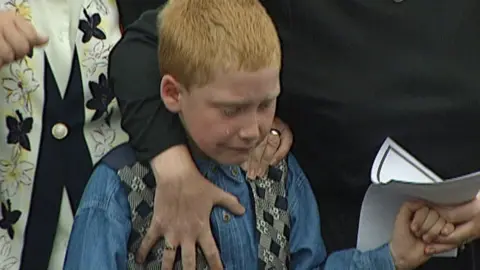 BBC
BBCThe son of a police officer who was murdered in Northern Ireland has urged MPs to scrap government plans for an amnesty over Troubles-era killings.
A key vote is taking place in the House of Commons on Tuesday afternoon as the UK government's controversial legacy bill reaches its third and final stage.
The proposed legislation would put an end to Troubles-era court cases and inquests.
It would also offer a conditional amnesty to those accused of killings.
Speaking in the Commons, Northern Ireland Secretary Chris Heaton-Harris said he was aware of the challenging nature of the amnesty but described it as a "crucial aspect" of the information recovery process.
"This government believes it's the best mechanism by which we can generate the greatest volume of information in the quickest possible time to pass onto families and victims," he added.
'Perpetrators protected'
However, Louie Johnston, whose police officer father was murdered, has asked MPs to put themselves in the shoes of people like him.
His opposition to the bill was echoed by the brother of schoolboy Stephen McConomy who was killed by a British soldier in Londonderry in 1982.
Emmett McConomy said the government's plan was aimed at "protecting the perpetrators of violence".
"They are the only real winners," he said.
Both men spoke to BBC News NI ahead of the Commons vote in which Conservative MPs are expected to overturn an attempt by the Lords to remove a key part of the bill.
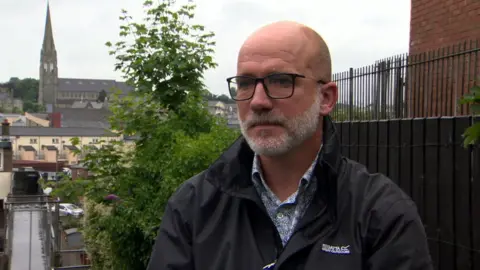
Peers had backed an amendment preventing a person from requesting immunity from prosecution as part of any future investigation.
But given the government's majority in the Commons it is expected that the immunity provision will be put back in.
However, it is now likely the government will fail in its bid to get the bill through Parliament before MPs begin their summer break on Thursday.
Northern Ireland Secretary Chris Heaton-Harris said immunity "would be key in helping to generate the greatest volume of information, in the quickest possible time, to pass on to families and victims".
"I know that this approach is challenging for many but we must address the legacy of the past in a different way if we are to achieve better outcomes for many who have waited for decades," he wrote in the Belfast Telegraph on Tuesday.
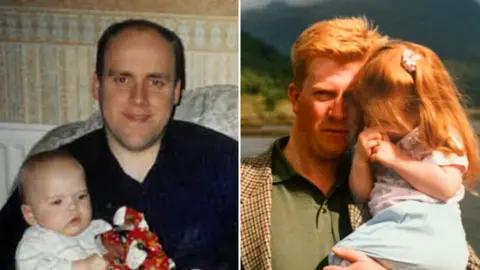 PSNI
PSNILouie Johnston was just seven years old when his father David Johnston and his Royal Ulster Constabulary (RUC) colleague John Graham were shot dead by the IRA in 1997 while on foot patrol in Lurgan, County Armagh.
Louie Johnson said that when he was told that his father had been killed he thought: "Why would anybody want to kill my daddy?"
He added: "He was my hero - this was the man that read me stories at night-time; that took me to the park; that was just fun to be around."
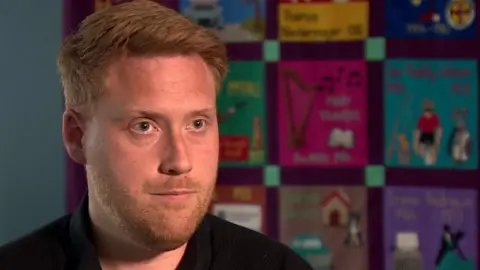
He shed tears as he walked behind his father's coffin on the day of the funeral, with the striking picture becoming one of the most poignant images of the Troubles.
"I can remember that day in great detail, right from arriving at the church for the service to seeing the heartache on my mum's face as we walked behind the coffin," he recalls.
"It's a very vivid memory that I have and I don't think it'll ever leave me."
'Show some empathy'
Ahead of Tuesday's vote Louie Johnston tried to make contact with some Tory MPs but did not get a response.
He told BBC News NI: "Can they put themselves in a situation where at seven years of age they were taken out of school and brought home and told their father had been killed?
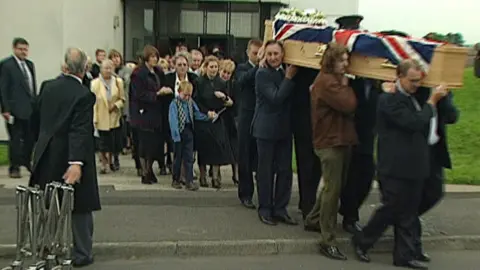
"I would ask them to show some empathy.
"Do they believe it is morally right to take away our avenue to justice?"
He also said that his family would not cooperate with the new body being set up under the government's plan.
The Independent Commission for Reconciliation and Information Recovery (ICRIR) will take over hundreds of unresolved Troubles cases.
It will be led by the former Lord Chief Justice Sir Declan Morgan.
The family of Stephen McConomy, the 11-year-old who died after being shot in the head by a plastic bullet fired by a soldier in the Bogside in Derry, has also ruled out any engagement with the new body.
They have also called on Sir Declan to "step aside and resign".
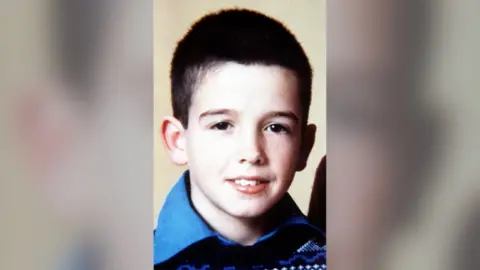 McConomy family
McConomy familyAfter a recent meeting with Sir Declan, Emmett McConomy said the Troubles bill was "cruel and unfair".
"It is serving no purpose other than that of the Conservatives and the Ministry of Defence and victims are lost within this process," he said.
"The real winners are the perpetrators of violence."
Mr McConomy also claimed Sir Declan had said he would resign from the ICRIR if there was any government interference in the commission's work.
In response, a spokesperson for Sir Declan said: "ICRIR has been deliberately set up as an independent body to ensure that it can do its vital work transparently and fairly.
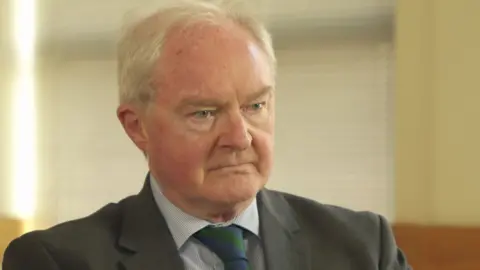
"We don't expect and would not accommodate any interference from government or from any other organisation or individual."
Sir Declan has previously dismissed any suggestion that he may resign.
He said: "I have only just taken up this role and am certainly not envisaging stepping down.
"This is a significant opportunity - perhaps the last - to help Northern Irish society come to terms with the past, and we need to focus on achieving as much as we can.
"We know that the challenge is complex but to not confront it would be a mistake."


The timeline may have slipped but there is no sense the government is preparing to backtrack on its Troubles bill.
That will be made clear later when Tory MPs turn up in numbers to reinstall the most controversial element of the legislation.
Offering immunity from prosecution is a key plank of the information recovery process but many suspect it won't be enough to tempt offenders out of the shadows.
This vote on Tuesday will simply knock it back to the Lords, and with no room in the peers' timetable it will be September before it is back on the agenda.
That still should leave the government enough time to hit its deadline of next May when the new information recovery body is due to be up and running.

